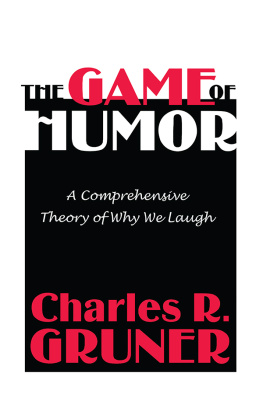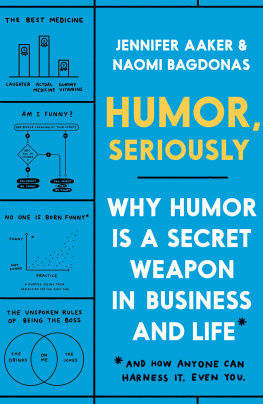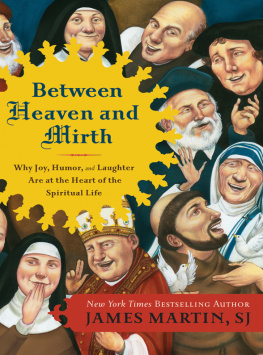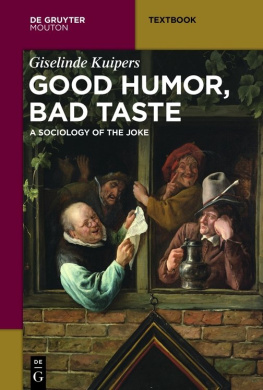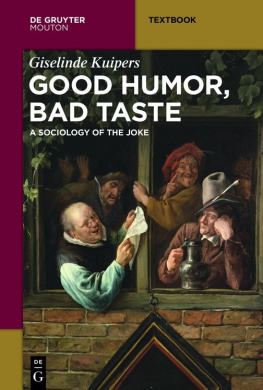THE GAME OF
HUMOR
First published 1997 by Transaction Publishers
Published 2017 by Routledge
2 Park Square, Milton Park, Abingdon, Oxon OX14 4RN
711 Third Avenue, New York, NY 10017, USA
Routledge is an imprint of the Taylor & Francis Group, an informa business
Copyright 1997 by Taylor & Francis.
All rights reserved. No part of this book may be reprinted or reproduced or utilised in any form or by any electronic, mechanical, or other means, now known or hereafter invented, including photocopying and recording, or in any information storage or retrieval system, without permission in writing from the publishers.
Notice:
Product or corporate names may be trademarks or registered trademarks, and are used only for identification and explanation without intent to infringe.
Library of Congress Catalog Number: 97-2825
Library of Congress Cataloging-in-Publication Data
Gruner, Charles R.
The game of humor : a comprehensive theory of why we laugh / Charles R. Gruner.
p. cm.
Includes bibliographical references and index.
ISBN 0-7658-0659-2 (paper : alk. paper)
1. Laughter. 2. Wit and humorPsychological aspects. I. Title.
BF575.L3G78 1997
128.3dc21 97-2825 CIP
ISBN-13: 978-0-7658-0659-8 (pbk)
ISBN 13: 978-1-56000-313-7 (hbk)
Contents
Introduction
In 1955 I was a first-year graduate student in desperate need of a topic on which to do a major research/lecture assignment at Southern Illinois University. With the kind help of an educational psychologist named Leslie Malpass I began a life-long study of humor, wit, and laughter. This fascination with why and how we humans laugh has enabled me to produce a number of term papers during my graduate education, a doctoral dissertation, one book, and a sizeable clutch of scientific studies published in scholarly journals and/or presented at professional meetings.
Early in my studies I encountered the superiority theory of humor advanced so forcefully by philosopher Thomas Hobbes and explained so lucidly in human evolutionary context by Albert Rapp. This explanation of why we laugh gave birth to a gestalt which made my understanding of humor and wit crystal clear. For forty years hence, I have been able to explain to myself and others in superiority theory language each and every instance of humor I have encountered.
But many humor experts and researchers, while admitting that superiority explains much humor, resist the notion that it can explain all humor. In my discussions with these folk the common plaint I hear is something like, I just dont feel superior to anyone or anything every time I hear or tell a joke.
I have concluded that this statement reveals the fact that such people do not really understand the ramifications of the theory. I suspect that they, like those who argue for the validity of the Adam and Eve tale without ever having carefully read Genesis, have not scrupulously read the relevant literature on the superiority theory.
I further suspect that the social pressure on us humans to be kind, understanding, and charitable (or, at the very least, civil) to all our fellow human beings conflicts with the idea that the pleasant, warm, fuzzy comfort that humor provides can always be explained in the negative terms of superiority, aggression, hostility, ridicule, or degradation. These folks, I guess, do not agree with comedian Jay Leno, host of The Tonight Show. He was queried in Walter Scotts Personality Parade (Parade, 19 May 1996): Why is it that Jay Leno, who doesnt hesitate to make fun of everyone else, never tells any jokes about his wife?
Jays answer: Jokes have to be demeaning to be funny [emphasis mine]and I have a lot of respect for my wife, Mavis. We dont argue. Fighting makes me uncomfortable. If I talk about Mavis on The Tonight Show, its to tell a funny story that happened to us, not to pick on her.
So: this book is my second major effort (first: Understanding Laughter) to explain the superiority theory of humor in socially acceptable language. I wish for the reader to think of all humor as a succession of games. The very idea of a game implies fun, leisure, entertainment, recreation, affable human interaction; but it also implies competition, keeping score and a winner and a loser.
To paraphrase what was recently pronounced in neighboring Atlanta, Georgia: Let the explanation of the games begin.
1
Win Or Lose: The Games We Play
Sign outside a church:
Next Sunday: Do You Know What Hell Is?
Come in and hear our organist.
The time: 12 March 1996; the place: Terrell Hall 214, University of Georgia. Event: my lecture to the members of SPC 490, Wit and Humor as Communication.
I wanted to quickly communicate to the students the central theme of this book. I told this story:
George Ostermeyer went into the operating room with a critical illness and for a surgical procedure that he knew in advance he very well might not survive. When he awoke, he found himself lying in a large sumptuous bed in a huge bedroom. On the walls hung priceless old masters paintings, and gorgeous antique tapestries; exotic oriental rugs covered the floor; beautifully haunting music cascaded softly from all sides. A manservant stood attentively at the side of Georges bed. Could I get you anything, Sir? Anything at all? he asked.
I must have died, replied George.
Yes, Sir, you certainly did, answered the manservant. Can I get you anything to make you comfortable?
Why, yes, said George. How about a large, very dry, very cold martini?
Done, said the servant, and George instantly held in his hand the biggest, coldest, driest martini he had ever sipped.
As George finished his martini the servant again asked if he wanted anything. George replied, Well, I am famished. How about a big, thick steak, medium rare, with baked potato and Caesar salad, and a bottle of your very best champagne.
Certainly, Sir, said the servant, and the bountiful repast was suddenly spread before the amazed gentleman.
After George finished his dinner, the servant once again asked if he could bring his master anything. George thought for a moment, then brightened: Id really like a woman. A blonde. Sayhow about a young Marilyn Monroe.
Of course, Sir. And suddenly a nubile Marilyn Monroe was under the sheet next to George, wearing nothing but perfect makeup and a smile, throatily saying through her smile, Dear GeorgeI am totally yours!
Wow, interjected our hero. I always dreamed of going to Heaven, but I had no idea I would find it this great!
Oh, but Sir, interrupted the servant, I fear you have the wrong impression. You did not go to Heaven.
As the story ended, there was a long, puzzled silence in the classroom.
I continued. Lets suppose that I am the servant and you are the Georges and I could grant each of you any and everything that any of you could possibly desire: suppose I could provide it instantly and completely, without reservation or condition. Would you really enjoy that?
After another pause, one student opined that such instant gratification could get pretty old pretty fast.
I asked if anyone present played golf. Three young men held up their hands. I turned to Craig, the golfer in the front row: Suppose I could grant that you would play perfect golf each time you hit the links. How (and what) would you do at perfect golf?

